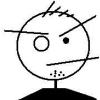In wake of the cultural and social upheavals of the 1960's, it became a common enough practice for popcult entertainments to acknowledge, if only grudgingly, the heightened awareness of egalitarian principles that permeated the era. Not surprisingly, this trend resulted in a number of stories where ostensibly laudable sentiments were presented (intentionally or not) in the most gratingly patronizing or condescending manner imaginable.
Which brings us to "The Powderpuff Run" from Hot Wheels #4 (September-October 1970). As the title suggests, the series was a licensed tie-in to Mattel's popular line of die-cast toy cars, which also spawned a short-lived Saturday morning cartoon series. "Short-lived" because it had the misfortune of airing at a time when the FCC actually had teeth in matters not directly related to "wardrobe failures" and has-been Irish rock stars uttering four letter words, and the cartoon was yanked when it ran afoul of the restrictions on advertising time. (Those restrictions would later be lifted during the Gipper's administration, thus paving the way for a flood of terrible, cheaply-produced toy cartoons and infomercials for questionable products. Yay, progress!)
The only thing that set the Hot Wheels comic apart from the mass of forgettable and forgotten kid's fare from that wild era when kids actually read non-manga comics was the participation of Alex Toth, whose outstanding powers of illustration were capable of elevating even the most pedestrian plot material. Unfortunately (or fortunately, depending on how you look at it) Toth was not involved in crafting "The Powderpuff Run," which was a Len Wein/Ric Estrada collaborative effort. (Talented men both, and I won't fault anyone for not bringing their A-game to a short back up feature in a licensed toy comic, but I gotta call 'em as I see 'em...)
The story begins with the member of the Hot Wheels racing team puttering around the Metro City Speedway. When team member Ardeth (no relation to Bernadeth) asks why the team isn't planning to field an entrant to the women-only "Daisy Derby" event (because there is no vocation so dangerous or skill-intensive that it cannot be diminished with a girly descriptor when women are involved), tempers begin to flare...
Before Ardeth can deliver Mickey's well-deserved braining, the arrival of a mysterious driver of exceptional ability captures the attention of the team. And guess what, she's a WOMAN!

She's not just any woman, either. She's Alexandra, cousin of the Hot Wheels Team's hated rival, Dexter Carter. Carter's gloating (coupled with his disturbingly misaligned nostrils) is too much for Mickey to take, and changes his mind about Ardeth's participation in the Daisy Derby...

Supporting a colleague's dreams and career aspirations? Whatever. Winning a dick-waving contest by proxy? COUNT ME IN!
With little time to waste, the team members commence burning the midnight oil to kit out a suitable ride for Ardeth to use. Because they're aiming for performance over aesthetic appeal, the final product ends up looking a bit rough around the edges, so Ardeth and Janet, the Daphne Blake to Ardeth's Velma Dinkley, take it upon themselves to do a little impromptu customization...

Is it an attempt to subvert traditional perceptions regarding gender? Or to unironically embrace them? The text is ambiguous on this point.
Race day arrives, and Ardeth discovers that winning might be a harder proposition than she had previously anticipated. Not only is Alexandra a skilled and aggressive driver, but she has also had her car outfitted by the same firm that does automotive customization work for Matt Helm and Penelope Pitstop. Even though she is in full view of thousands of (granted, mostly shitfaced) spectators, she doesn't think twice about employing these non-street legal modifications...

As Ardeth struggles to regain the lead, Janet hatches a little scheme of her own to neutralize Alexandra's decisive advantages on the asphalt...


Other signs Janet had considered using included "Your attitude scares potential mates," "Work or family? You can't have it all," and "Your biological clock is ticking!"
Alexandra's fall to the inexorable forces of biological determinism leaves a clear path to the checkered flag for Ardeth, who nets the Daisy Derby Cup (which is just like the Metro City 500 Cup, but decorated with plastic flowers and pink ribbon and stuffed with a $25 certificate for a pedicure instead of a check for $5000) with no further complications.
Feeling empowered? I know I am. (Wait, I meant "confused and slightly queasy." I confuse those all the time.)

The Bodysnatchers - Ruder Than You (from a 1980 single; collected on The 2-Tone Collection: A Checkered Past, 1993) - We named one of the local feral cats (the mother of Lil' Baby Setz and Nubby, and therefore the grandmother of our kittens) "Rude Girl," in reference to this song and The Clash's "Rudie Can't Fail." How's that for insular personal trivia?
As for the song, it's a swell bit of all-female 2-Tone ska. Singer Rhoda Dakar later went on to work with The Specials and other members of the band eventually formed the Belle Stars.
The Dictators - (I Live for) Cars and Girls (from The Dictators Go Girl Crazy! 1975) - An admirable philosophy, I suppose, providing the car in question isn't a 1985 AMC Eagle and the girl isn't Sally Kern.





1 comments:
Excellently written bitterandrew.
Post a Comment